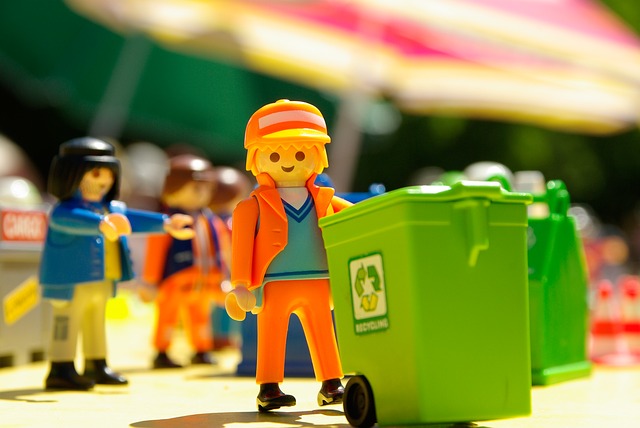
I hate garbage.
I hate taking care of garbage, getting rid of it, even looking at it. So when I saw an article on Zipcar titled, “Life Without a Trashcan,” I was fascinated.
Fascinated by the little glass jar in which the article’s subject had her entire year’s worth of waste. Fascinated by the concept that this is her reality—and that it’s possible.
One Mason jar. With all her trash. For one entire year.
The bar is pretty high, but I researched some things that I could do right now. At core, I’m a hacker, and I like to see how to manipulate things to make less waste.
It’s easiest for me to visualize it by area. Here are five areas where changes can be made immediately:
The Kitchen.
Reduce the amount packaging in what you buy. Fruit and veggies don’t require a plastic bag from the store; bring a string bag or a little fabric one. The produce clerk can weigh your things, or they can be taken to the cashier. If the item comes in a box with a barcode, you have a bit of packaging. Some of the packaging can be recycled, some can’t. Choose wisely. Get a little compost bin and read up on how to use it. Gardens love compost.
Advanced Rules: If you don’t live in an area with a compromised water supply, drink tap water. Get a stainless steel or glass reusable bottle. According to Ban the Bottle, in the United States 24 percent of bottled water sold is either from Pepsi’s Aquafina (13 percent of the market) or Coca Cola’s Dasani (11 percent of the market). Both of these brands are bottled, purified municipal water.
The Bathroom.
Larger containers for shampoo and conditioner use less plastic, and reusing them is even better. If you’re lucky, you have a refill station for shampoo in your area. For the ladies, menstrual cups last 10 years—or consider washable pads. There’s a bamboo toothbrush that is compostable, too. Who knew? I buy toilet paper that comes in paper wrappers so there’s no plastic involved. I also buy bars of soap wrapped in paper, or without packaging. No single use items—except the toilet paper.
Advanced rules: Make your own toothpaste or deodorant.
Paper.
My friends love getting reusable fabric shopping bags as the packaging for their gifts. Paper gift bags can be reused; tape or tie the gift tag on instead of writing on the gift bag. Get off mailing lists for paper catalogs and unsolicited mail. I scan all my papers and shred them to recycling. I love the idea that all the bills I get have the potential to become toilet paper someday.
Advanced Rules: At work, I try not to print. I question people when they ask me to print something and sometimes just a little push-back is enough. “Do you want me to email you the receipt or do you need a printed one?” Yes, that little nuance in the request does work.
And here’s a popular work email signature:
The Wardrobe.
Bulk laundry soap is a possibility; so are refillable containers for laundry soap storage. Soap nuts are another alternative. Some “dry clean only” items can be hand-washed so you can avoid that the plastic cover and cheesy wire hanger packaging scenario. I refuse to buy anything that requires that much work as up-keep. Give the hangers back to the store when you buy clothes; they reuse them. Consider what items use unnecessary packaging, such as bulk underwear packaged in plastic versus loose pairs in a bin. Learn to sew on a button; it’s sad to throw out those cute khakis just because a button popped off after that picnic feast. Minor repairs extend the life of a garment.
Advanced Rules: Develop a capsule wardrobe and donate the excess to a charity.
Electronics:
Look, I like the new shiny objects as much as the next person, and my PocketPhone has my schedule, contacts and helps me maximize the utility of my time on this earth. Having said that, I realize there is an environmental cost for this. I use my phone until it’s done. I know a few home repair tricks and have done minor fix ups with my iron and small appliances. If it’s already broken, and you have skills, why not? Rewire that lamp, or pay someone else to do it. Buy LED light bulbs; they need replacing every 30,000 hours—as opposed to 3,000 to 4,000 hours for incandescent.
Advanced rules: I buy used handsets to minimize the environmental impact of phone manufacturing, and since my information is backed up, I can use my phone until its last gasp. I’m not scared.
~
I do some of these things now, while others are short-term goals. Reducing my personal traffic to the landfill is one goal that I am working on in incremental stages.
Will I be hard core enough to limit it to one Mason jar?
Every effort I make is meaningful, and even if I don’t get there, it’s a game I can play. How could I limit more trips to the garbage can? How can I be more aware and deftly avoid creating garbage on the front end while shopping?
There’s a saying on Reddit, “the best tips are in the comments,” so leave some below for us!
~
Author: Josette Myers
Apprentice Editor: Julie Balsiger; Editor: Toby Israel
~






Read 3 comments and reply